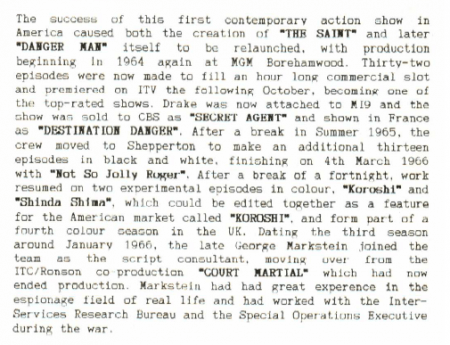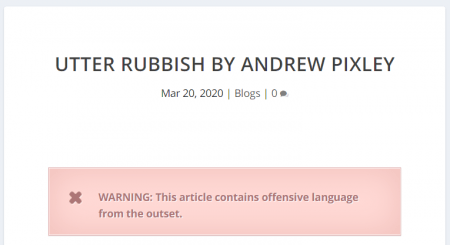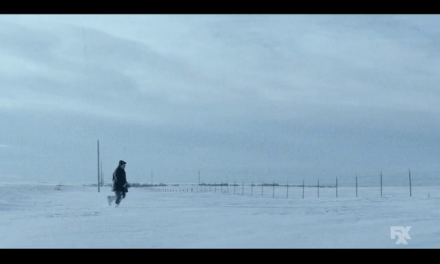Had to throw out some humping salad from the fridge the other day. We could probably have got away with it, but it was a tad beyond its “best before” date and why take the chance? So, I had to make an extra trip to the shops… which probably put me in a humping bad mood for my days’ reading and triggered what follows.
Now, I think that previous offerings have made it clear that I like to use these opportunities to celebrate the achievement and kindness of talented people, promote some shows which have slipped through the cracks in the pavement of television history, and to remind myself about why we all started writing about this strange time-consuming medium in the first place. But this time around – I’m sorry – I think I really need to take a misleading research article I read after buying my fresh salad and give it a kicking. If only to stop other people wasting valuable hours of their lives in reading and – goodness help us – repeating utter rubbish.
The article in question concerns The Prisoner (1967-1968), Patrick McGoohan’s distinctive, stylish attempt to take the genre of transatlantic action show being mass produced by ATV during the 1960s and reshape it as a mini-series which offered thoughts about personal freedom within contemporary society during … amidst the obligatory fist-fights of any self-respecting ITC-distributed hero of the day.
So, let’s start to put the boot in with a few well-aimed kicks at some particularly dubious pieces of mis-information…
‘[Script Editor George] Markstein had had great experience in the espionage field of real life and had worked with the Inter-Services Research Bureau and the Special Operations Executive during the war.’ Well, that’s a big pile of poo for a start off! And that’s just the second paragraph! George Markstein was really a journalist! For goodness sake – just go and buy a copy of Roger Goodman’s George Markstein and The Prisoner (2014) and do your flaming research properly!
‘The fact that [the episode Do Not Forsake Me Oh My Darling] would start the second season is evident by the fact that it is set exactly a year after Number 6’s resignation, i.e. the following season.’ For hump’s sake – no it wouldn’t! By the time the episode started shooting, everyone knew there wouldn’t be a second season. The crew had struggled to make the first thirteen and returned in August 1967 to shoot a final four to satisfy the minimum network requirement from CBS. Just go and look at the humping trade papers – it’s all there.
‘The rest of the [final] episode [Fall Out] was made in the studio under McGoohan’s control in early January 1968, weeks before transmission.’ Right – so you’ve not even bothered to look at the PDF documents on the DVD set for the show either. They are there, or are you just too lazy to pop the disc into the laptop? Look! Call sheets! Fall Out and The Girl Who Was Death conclude production at MGM on Thursday 30 November 1967.
And this ill-researched stuff has been out there online, freely available for anyone to read and be mis-informed by here and here under the title Everyman’s Production. And people are reading it and citing it to me as evidence as they construct various arguments about how and why Mr McGoohan’s legendary leap into TV production ended up the gloriously bonkers way that it did.
Now, those of you who have actually clicked on the links in that last paragraph to get a grasp on what I’m talking about will already be ahead of where this text is going [i]. Partly because, as you’ve seen, the links don’t actually work any more. Which is a bit of a relief, what with the author being me… and hence the writer whose work I am crucifying is in fact me from 33 years ago. Which brings up two problems…
First of all, fan research 33 years ago was very different to what it is now. Today, access to documents and publications is comparatively easy – a few key strokes takes me to the whole of The Times, Television Today, Radio Times listings, specialist sites like TV Brain, and all manner of other things. But back then it was trips to libraries – train journeys where you hoped you wouldn’t find that key issues of TV World had been dismembered by Stanley knife at your destination. Articles from magazines which numbered no more than a full complement of fingers plus a smattering of fanzines of indeterminate print styles. Hard research was often reduced to a comment made by a bloke you met at a convention who’d got a mate who once spoke to one of the actors… and you had no means of verifying validity in the way that we do now.
Secondly, while books and magazines – at a glance – can be dated from look, design, content or even the date printed on the front, websites are a bit timeless. Oh, I know that we can tell from the layout or tricks played in their construction that these may be recent or a decade old or pre-21st Century… but people don’t seem to check. And Anthony McKay’s approach to the Time Screen website hasn’t dated that badly [ii]. Like the availability of archive TV, we no longer have the past and the present… just lots of different presents.
When I wrote those words, I felt sure – or I wouldn’t have written them. But the trouble is, we can change our minds in a minute, an hour, a day, a year, a decade… and certainly in three decades.
Actually, having read the article again, I’m still fundamentally happyish with about 50% of it, think another 25% could be written in a more engaging manner, that 15% of it could be significantly improved with the new resources available, and that 10% of it – including the bits above – should just be thrown away. Much like those bits of salad in my fridge.
And, of course, when I say that I wrote that 33 years ago, that’s only relative to me, here, today (and/or next week), where I am typing now on this rainy Thursday (or Sunday). I have no idea when you’re actually reading this. Assuming that the ants haven’t taken over, you might still be reading that article 66 years after I wrote it [iii] on woefully inadequate research compared to what you have access to now. I sincerely hope that Tobias’ design of this page hasn’t dated too badly, and also that if you do have better research available to you, that you’re making full use of it and writing even better stuff. Who knows, I may even still be around to look in and enjoy it.
What I have learnt over the years since I first put finger to typewriter and pounded out something to be read by a set of retina beyond my own is that everything stands a good chance of being obsolete within seconds of my digit withdrawing from the final keystroke. Could be minutes, could be hours, could be days, could be years.
But that doesn’t make me want to stop writing it. I know that I still care about these shows and want to do my best. As I did then – and as I always hope to do.
I fear that I may continue to utter rubbish of this sort every so often but – please – before consuming, have a quick look at my “best before” dates and determine if I’ve gone off or not.
Andrew Pixley is a retired data developer. For the last 30 years he’s written about almost anything to do with television if people will pay him – and occasionally when they won’t. And, you know what, by the time you read this bit, it’s probably already out of date, as proved by all the footnotes. Oh hump, what’s the point…?
Footnotes:
[i] Incidentally, the two links did work last week when I originally wrote this. But, just before submission, the website was retired. Which is kinda fortunate because…
[ii] … which, if that link worked either, you’d have seen. But, no, that’s gone too. Take it from me… it was lovely. All gorgeous reds and yellows. Real sense of style, you know…
[iii] … which you won’t because, as we now know, me a week into the future now knows that this website has been consigned to that great internet in the sky.









Thanks for that very witty blog, Andrew; I was beginning to feel almost sorry for your unnamed victim… It’s every academic’s nightmare to discover a factual error in an old publication, and I hope that in thirty-three years I’m not castigating my younger self for a similar misdemeanour!
Thank you for taking the time and trouble to post a response Richard – most kind.
Glad that you were taken in for the first part – I think it’s important that I’m tough on myself before I start going around being tough on other people, and that if I need to make this point it’s only right that I should subject me own work to this scrutiny rather than cite what others have written as examples.
But so much has changed… and I think it’s only right that we move with the changes. I like to discover new stuff and understand more. To my mind, nothing is set in stone.
Take care during these tricky times.
All the best
Andrew